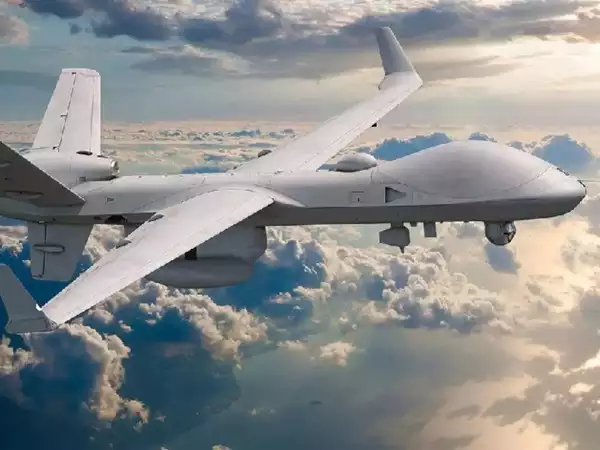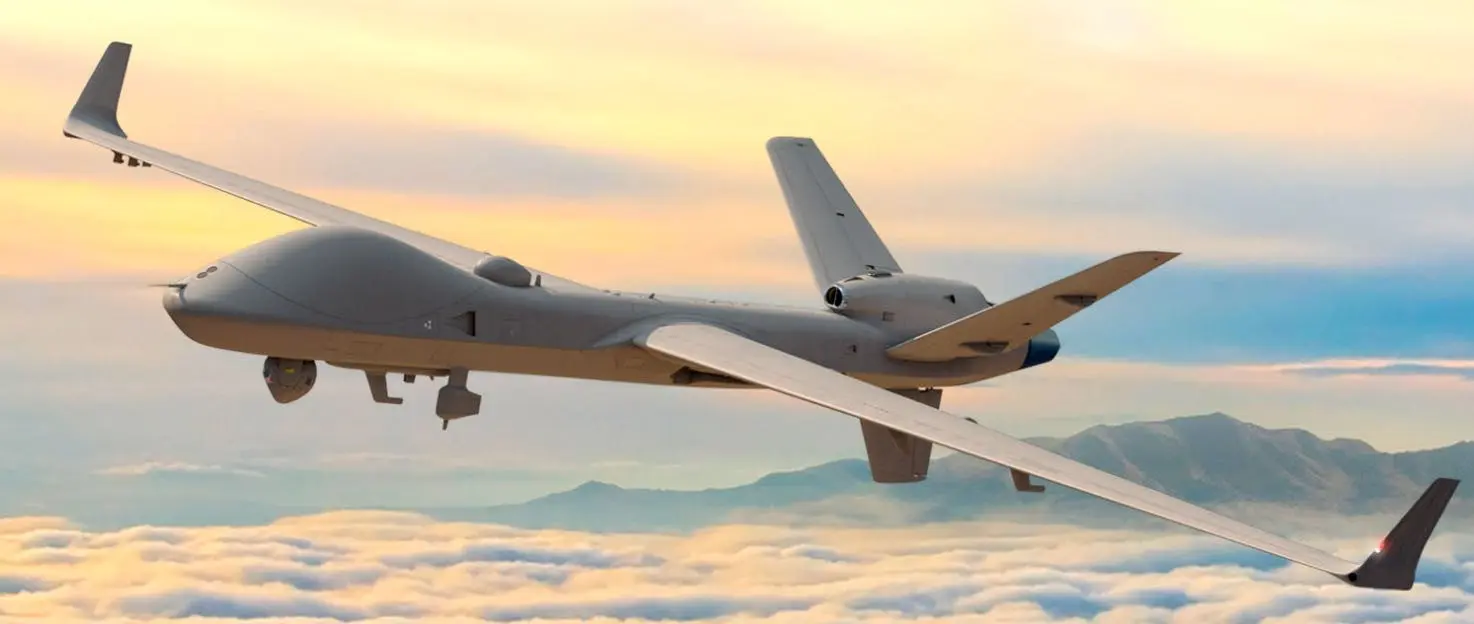At the International Defence Exhibition & Conference (IDEX) 2025 in Abu Dhabi, General Atomics Aeronautical Systems, Inc. (GA-ASI) confirmed that it is in early-stage discussions with Saudi Arabia regarding a potential sale of MQ-9B SeaGuardian unmanned aerial systems (UAS). The deal, if finalized, could significantly enhance Saudi Arabia’s surveillance and defense capabilities while marking a shift in the Kingdom’s military procurement strategy toward Western technology.

Early Negotiations and Potential Scope of the Deal
General Atomics President Dave Alexander highlighted the substantial interest Saudi Arabia has shown in acquiring the MQ-9B SeaGuardian drones. According to Alexander, discussions remain in the preliminary stages, but the proposed package would likely include a significant number of aircraft, support infrastructure, and potential collaboration with local Saudi industries. The exact number of drones and the financial scale of the deal remain undisclosed.
The MQ-9B SeaGuardian is an advanced maritime version of the widely used MQ-9 Reaper drone, capable of performing a variety of critical missions, including intelligence gathering, surveillance, reconnaissance, and maritime security operations. Given Saudi Arabia’s strategic location and its extensive coastline along the Red Sea and the Arabian Gulf, these drones could provide the Kingdom with enhanced capabilities to monitor its territorial waters, combat piracy, and protect key maritime trade routes.
Strategic Implications for Saudi Arabia
A potential deal with General Atomics would represent a major milestone in Saudi Arabia’s defense procurement policy. The Kingdom has historically acquired drones from non-Western suppliers, notably China and Turkey. In 2014, Saudi Arabia purchased CH-4 drones from China, followed by Wing Loong II systems. More recently, in 2023, Saudi Arabia signed a landmark agreement with Turkish manufacturer Baykar for the supply of Akinci combat drones, which marked the largest defense contract between the two nations.
However, the MQ-9B SeaGuardian represents a superior technology in terms of endurance, sensor payload, and overall operational capabilities compared to the systems Saudi Arabia has previously procured. The drones offer multi-domain situational awareness and can operate in harsh environments with extended endurance, making them highly suitable for Saudi Arabia’s defense needs. Their advanced maritime surveillance capabilities would also enable the Kingdom to track naval threats, monitor shipping lanes, and conduct search-and-rescue operations more effectively.
Strengthening U.S.-Saudi Defense Ties
If the deal is finalized, it could mark a significant step toward strengthening U.S.-Saudi defense relations. In recent years, the U.S. has been cautious in approving major arms sales to Saudi Arabia due to geopolitical and human rights concerns. However, as the regional security landscape evolves, Washington may view such a deal as an opportunity to counter growing Chinese and Russian influence in the Gulf.
For Saudi Arabia, securing access to U.S. military technology remains a key priority as it modernizes its armed forces. The potential acquisition of the MQ-9B drones would not only bolster its defense capabilities but also signal a renewed commitment to maintaining strong defense ties with the U.S. amid shifting geopolitical dynamics in the Middle East.
Economic and Industrial Benefits
Beyond military advantages, the deal could bring significant economic benefits to both the U.S. and Saudi Arabia. General Atomics President Dave Alexander emphasized that if the sale proceeds, it could create tens of thousands of jobs in the U.S. across various sectors, including manufacturing, maintenance, and logistics.
In Saudi Arabia, the proposal includes potential plans for local industrial participation, aligning with the Kingdom’s Vision 2030 initiative. Vision 2030 is a comprehensive economic reform strategy aimed at diversifying Saudi Arabia’s economy and reducing its dependence on oil revenue. A key pillar of this strategy involves localizing defense production and technology transfer, ensuring that a larger portion of military procurement benefits the domestic economy. If General Atomics agrees to establish partnerships with Saudi firms for maintenance, training, and potentially assembling certain drone components locally, it could be a crucial step toward fulfilling Vision 2030’s defense sector goals.
Regional Defense Trends and Competition
The growing interest in unmanned aerial systems across the Middle East highlights the increasing importance of drone technology in modern warfare. Several Gulf nations have been actively expanding their drone fleets, with the United Arab Emirates (UAE) also reportedly in discussions with General Atomics for MQ-9B SeaGuardian drones. The broader trend suggests that Gulf countries are prioritizing advanced unmanned systems to enhance their intelligence, surveillance, and reconnaissance (ISR) capabilities.
Meanwhile, China and Turkey have aggressively marketed their drones to the region, positioning themselves as alternative suppliers to U.S. and European defense firms. The success of Turkish drones in conflicts such as Libya and Nagorno-Karabakh has bolstered their appeal to Middle Eastern buyers, leading to increasing competition in the market.
However, Western systems like the MQ-9B SeaGuardian remain superior in terms of sensor integration, interoperability with NATO systems, and long-range operational capabilities. Saudi Arabia’s potential shift toward acquiring these U.S.-made drones could indicate a preference for higher-end technology that aligns more closely with Western military standards.
Challenges and Considerations
Despite the potential benefits, several challenges could impact the finalization of the deal. U.S. arms sales to Saudi Arabia have faced scrutiny in recent years, particularly from lawmakers concerned about the Kingdom’s involvement in the Yemen conflict and broader human rights issues. Any proposed sale of the MQ-9B drones would require approval from the U.S. government, including the State Department and Congress.
Additionally, Saudi Arabia’s previous investments in Chinese and Turkish drone technology raise questions about interoperability and integration with Western systems. The Kingdom would need to ensure that its existing drone fleet can operate seamlessly alongside any new U.S.-made systems to maximize efficiency and effectiveness.
Conclusion
While still in its early stages, the potential sale of MQ-9B SeaGuardian drones to Saudi Arabia represents a significant development in the Kingdom’s defense procurement strategy. If the deal proceeds, it could enhance Saudi Arabia’s maritime surveillance and defense capabilities, strengthen U.S.-Saudi defense relations, and support the economic goals of both nations.
At the same time, geopolitical factors, legislative approval in the U.S., and Saudi Arabia’s evolving procurement strategy will all play crucial roles in determining whether this landmark deal materializes. As discussions progress, this potential acquisition will be closely watched by defense analysts, policymakers, and industry leaders worldwide.
Salman Khan and Sanjay Dutt Film Hollywood Cameo in Saudi Arabia



